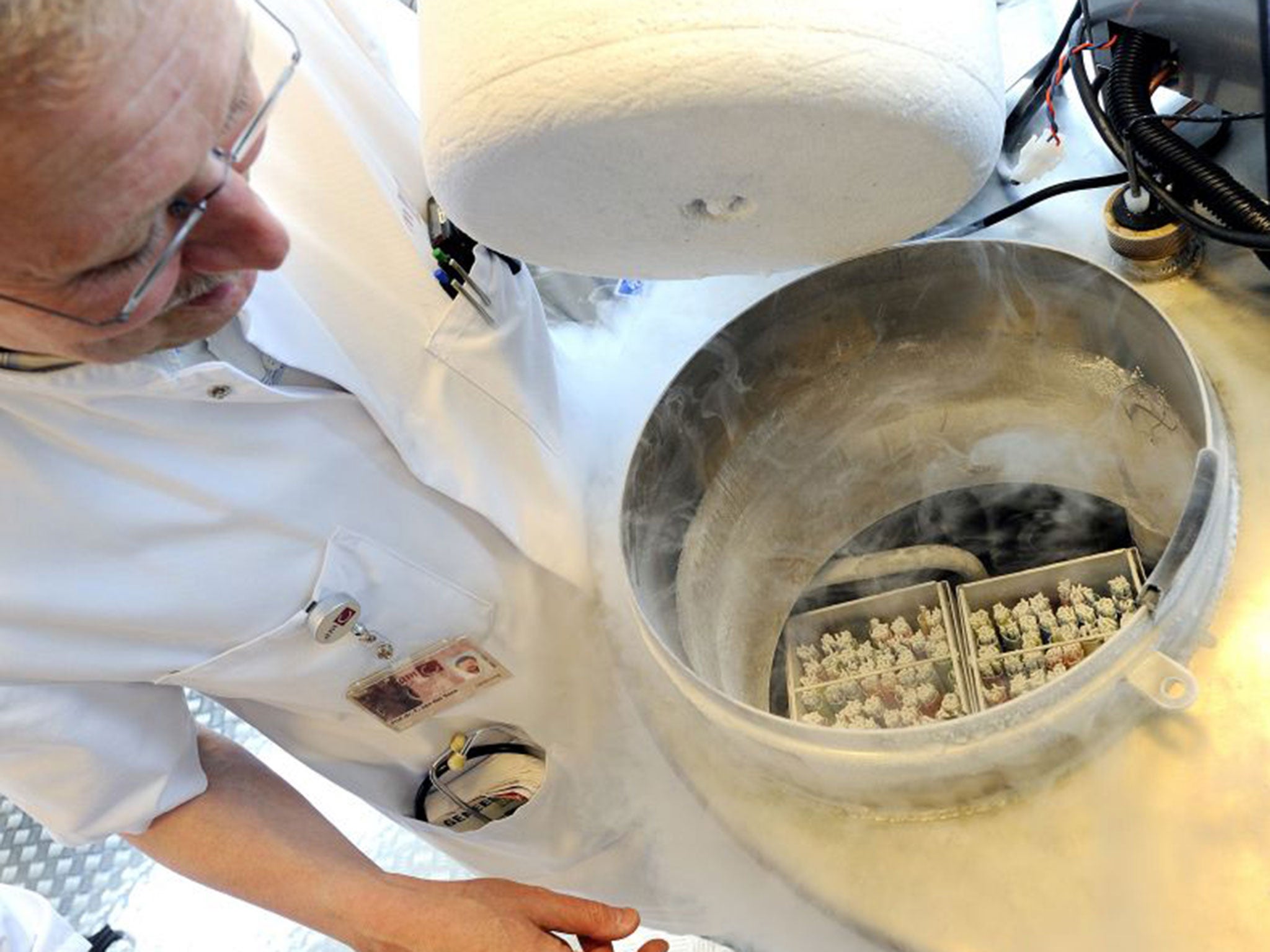A woman's option to freeze her eggs should never be a job perk
Silicon Valley's latest wheeze is not just creepy, it's telling us that motherhood is incompatible with a career


Your support helps us to tell the story
From reproductive rights to climate change to Big Tech, The Independent is on the ground when the story is developing. Whether it's investigating the financials of Elon Musk's pro-Trump PAC or producing our latest documentary, 'The A Word', which shines a light on the American women fighting for reproductive rights, we know how important it is to parse out the facts from the messaging.
At such a critical moment in US history, we need reporters on the ground. Your donation allows us to keep sending journalists to speak to both sides of the story.
The Independent is trusted by Americans across the entire political spectrum. And unlike many other quality news outlets, we choose not to lock Americans out of our reporting and analysis with paywalls. We believe quality journalism should be available to everyone, paid for by those who can afford it.
Your support makes all the difference.When the great brains of Silicon Valley came up with their latest wheeze, to fund the freezing of their female employees' eggs, they probably felt very pleased with themselves. This undoubtedly bold offer to staff, which allows them to literally put their baby-making plans on ice so they can press on with their careers, might have even prompted tech giants Google, Facebook and Apple to imagine that they had single-handedly solved gender inequality.
"See how we've sorted out the women," the young executives might have crowed, while pedalling around beanbag-strewn offices on tiny bikes. They probably pictured the scene on induction day, during which hordes of female recruits, drunk on their newfound empowerment, would flood through their doors. "Welcome!" the HR bods would chirp. "Pop your eggs in the freezer, and we'll show you to your desks."
Except that reproduction is rarely that straightforward. Whether assisted or not, I've yet to meet a woman whose pregnancy didn't involve complications, many merely uncomfortable, some downright dangerous.
Putting aside the well-documented problems associated with putting off parenthood until later in life, the idea that a woman – a human being with thoughts and emotions, and a body that is unique and unpredictable and needs taking care of – should be encouraged to bung her eggs in an ice box, and grow a family when it suits her employers, isn't just creepy, it's also breathtakingly irresponsible.
There's no doubting that the ability to freeze eggs for women who might otherwise be unable to conceive is a beautiful thing. For those who haven't found the right partner, or who have had cancer treatment, or who suffer from such conditions as premature menopause, it's a miracle.
But the procedures women go through during assisted reproduction – and the process of freezing eggs requires serious and complex intervention – aren't to be treated lightly. I've had in vitro fertilisation treatment and, trust me, it ain't no picnic. While it's worth the pain and trauma if you are lucky enough, as I was, to eventually make a baby, the process is tough.
There are, of course, the countless, uncomfortable legs-in-stirrups scenes in which a succession of men – and they usually are men – rummage around in your insides with the sensitivity of a car mechanic. There's the drug regimen – a first round of jabs to shut down the natural hormones (in effect putting you through the menopause), and a second to introduce artificial hormones to stimulate egg production – that can leave you feeling bloated, depleted and sore.
Then there's the egg retrieval and implantation, which at some clinics take place under general anaesthetic but in many do not. These processes are physically painful and emotionally draining. Even with the support of my partner, I have rarely felt so vulnerable, fearful and alone.
Most bizarre and tense is the process during which the freshly fertilised eggs are in vitro (in glass) that is, out of your body and effectively in a saucer, under the care of embryologists. Ours was a nail-biting four-day wait in which we received daily calls from the lab with updates as to our eggs' progress.
Nine had been successfully fertilised and, as the days went by, we became increasingly emotionally invested in these tiny balls of cells. On the fourth day it appeared we had three "viable" embryos, and the possibility of being parents suddenly seemed very real.
The next morning I travelled to the clinic ready for implantation, cautiously imagining how these three little blobs might turn out. Then, as I was changing into my surgical gown, the embryologist popped by to tell me that one had failed overnight. I had two left, but I still bawled my eyes out.
Most of the women I met who were undergoing similar treatment found it hard-going in one way or another. Overshadowing the process is the nagging awareness that it might not work and you will have to go through it all over again. Given the choice, all would have preferred to conceive using the more traditional method of a couple of glasses of wine and an early night.
But now mega-corporations are asking us to take all this in our stride. They are asking us to accept that such invasive medical procedures and the associated heartache is part and parcel of being a woman who wishes to have a fulfilling career. Is this really what that irritating concept known as "having it all" has become?
There is, of course, a comfort of sorts in knowing that employers, albeit the ones with massive budgets and rainbow suites devoted to blue-sky thinking, are mulling over these issues. That they are trying to find a solution to the prevailing notion that, given our tendency to pop out babies, women aren't worth investing in.
But when that investment comes in the form of freezing eggs, rather than, say, overhauling maternity policy or advocating flexible working, then they are sending out a grim message. They are telling us that motherhood is a barrier to a serious career, and a drain on our productivity. They are telling us that reproduction is best scheduled around an office timetable, and any physical or emotional fall-out should be swept under the carpet so that standards are maintained. They are telling us that assisted reproduction is no biggie, much like popping out for a pedicure in your lunch hour.
The intentions of Apple, Google and co may have been noble in trying to offer women more choices but, if they care a jot about the health and happiness of their workforce, this isn't the way to do it.
Join our commenting forum
Join thought-provoking conversations, follow other Independent readers and see their replies
Comments